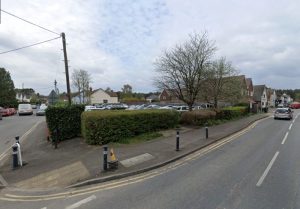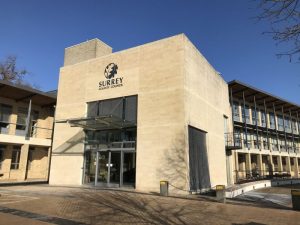On Saturday, Dings Crusaders RFC hosted a veritable feast of four finals. A large and enthusiastic crowd was bathed in unbroken sunshine.
The day began with the amuse-bouche of Ashley Down Old Boys downing the colours of Hastings & Bexhill to the tune of 34–20. Next came the hors d’oeuvres, as Cheltenham North overcame Honiton 38–32. The penultimate plate served up a thrilling 28–24 win for Ealing Trailfinders over Old Bristolians.
The afternoon culminated in the main course: the Papa Johns Regional 2 South Plate Final between Sutton & Epsom and Drybrook. The latter, having lost this fixture 42–29 to Reed’s Weybridge last year, came into this match on a season of unbridled success. Champions of the Regional 2 Tribute Severn League and winners of the Forest of Dean Combination Senior Cup with a 37–27 triumph over Cinderford, Drybrook now completed a trophy treble by vanquishing Sutton 36–27.
Freddy Bunting initiated proceedings, and the Squirrels dominated the early exchanges. A penalty was advanced to the 22. Having secured possession from their throw, Drybrook cut through the defence but lost the ball near the line. Fortunately, the referee brought play back for an earlier infringement. Fullback Haydn Lewis stepped up to give Drybrook a 3–0 lead. Sutton’s start was further hampered by a cut to Ewan McTaggart’s eye that temporarily forced the gargantuan lock off to be bandaged up.
The first signs of recovery came from a searing break by Tom Lennard that brought Sutton close to the enemy 22. Awarded a penalty, Sutton drilled it into the corner. McTaggart returned, the ball was won, and hooker Sam Lennie crossed the whitewash for the first try of the afternoon. Captain Bunting added the extras to give Sutton a 7–3 lead.
Invigorated, Josh Rea made a fabulous break that led to another penalty on the 22. However, the doughty Drybrook defence held firm. The game flowed end to end. On the half-hour mark, Sutton were awarded a penalty and Drybrook’s Jack Moss was shown a yellow card. Opting for a try over points, S&E were rewarded as Sam Lennie forced his way over for a second try. Though the conversion missed, the Sutton supporters were soon celebrating again. McTaggart and Glanville secured the restart, and Adam Bibby jinked his way 40 metres to score a stunning solo effort. Bunting converted, taking Sutton to a 19–3 lead.
As has so often been the case in this annus mirabilis for Drybrook, it was their talismanic captain Mitchell Bourne who provided inspiration. He powered over the line from a catch-and-drive, with Lewis adding the conversion from the flank to close the gap to 19–10.
Approaching the break, Sutton were awarded a penalty near halfway. With clock awareness, Bunting knocked over the long-range effort to give Sutton a 22–10 lead at the interval.
The second half began swiftly. Drybrook’s Mitchell Baldwin made a searing 40-metre break before flanker Bailey Watts applied the coup de grâce. Lewis converted to make it 22–17. With momentum on their side, Drybrook surged forward again. Cai Rogers made a stunning break, and McTaggart received a yellow card for high contact. Drybrook capitalised, scoring twice in five minutes. Cai Roberts crossed to level the match at 22–22, and Mitchell Baldwin added another try. Lewis converted to take the lead 29–22.
In a parallel to the first half, Sutton responded. McTaggart returned just in time for another attacking lineout. Lennie completed his hat-trick. Though Bunting missed the conversion, the score stood at 29–27.
Moments later, the pendulum swung again. Bibby was shown a yellow card, meaning the influential centre would miss most of the remainder. Sutton were awarded a penalty from 45 metres, but Bunting’s kick narrowly missed.
Drybrook came close again with a clever kick that exposed Sutton’s cover, but the defence scrambled back just in time. However, the respite was brief. Replacement Ioan Jones strode over for the crucial score, converted again by the nerveless Lewis to make it 36–27.
Sutton fought to the final whistle but could not close the gap. Drybrook’s celebrations began at the final whistle.
Though Sutton came up short, their performance capped a season of definite upward trajectory. Drybrook were worthy winners, concluding a triumphant campaign—one that may require a carpenter to extend their trophy cabinet.
Teams:
Sutton & Epsom:
Scott, Ghumra, Bibby, Bunting (capt.), Huie, Lennard, Findlay E, Johnson, Lennie, Boaden, Glanville, McTaggart, Rea, Jones, Hegarty.
Replacements: Hilton, Madadangoma, Duey, Tame, Davies, Nelson, Symonds.
Drybrook:
Lewis, Chappell, Price, Baldwin, Roberts, Morgan B, Rogers, Jelf, Addis, Morgan L, Moss, Watkins, Watts, Peaper, Bourne (capt.).
Replacements: Hale, Morgan C, Greenway W, Rowley, Tinker, Greenway R, Jones
Image credit: Iain Frazerr











